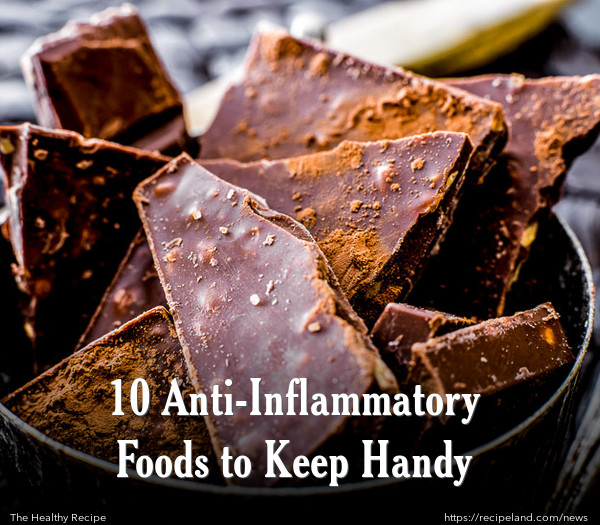When our body experiences inflammation as a reaction to outside irritants, many irritations can occur. Our immune system has more difficulty handling wounds and infections, and becomes vulnerable to chronic conditions.
Inflammation has become an epidemic because of stress and our overindulgence with processed foods. This means that the natural balance of the body is disrupted and can lead to acne, allergies, neurological disorders, autoimmune disorders, and joint pain.
There is some good news, however, and it is the fact that inflammation can be simple to reverse by eating the right foods that can nourish your body and fight inflammation by reducing free radicals and toxins in the body.
Here are 10 foods that can help reduce inflammation.
1. Olive oil
Olive oil contains polyphenols, which have many anti-inflammatory and antioxidant benefits. When you use extra virgin olive oil, you will be enjoying a food that gets 70% of its fat content from monounsaturated fats like oleic acid, which can lower blood pressure and reduce bad (LDL) cholesterol.
2. Herbs and spices
Many herbs and spices contain health-promoting phytonutrients while making dishes tastier without adding excess salt and sugar, which promote inflammation. Front runners are cinnamon, which can help reduce bloating and help to stabilize blood sugar, turmeric, which provides anticancer properties, oregano, which has antibiotic properties, and rosemary and lavender which can reduce anxiety and pain.
3. Garlic and onions
These herbs contain short-chain fructo-oligosaccharides (scFOS), especially leeks, asparagus, jicama, artichokes, and Jerusalem artichokes. Each of these contains low calorie carbs, and, because they are not fully digested in the gut, what remains helps to feed the bacteria in our intestines, leaving us with a healthier gut. This process helps to reduce inflammation and boost the immune system.
4. Dark chocolate
Dark chocolate that contains 70% cocoa or more can be one of the closest things to a guilt-free dessert. According to many research studies, it can improve blood flow, reduce blood pressure, and improve your response to a carb-loaded meal by improving insulin sensitivity and this helps to reduce the risk of developing diabetes.
5. Avocados
There are many terrific health benefits to avocados because they contain significant amounts of mono and poly-unsaturated fats, phytosterols, alpha-linolenic acid, and carotenoids. Each of these compounds help to reduce inflammation, help balance blood sugar, control cholesterol, and reduce pain related to osteoarthritis and rheumatoid arthritis. Use avocados in place of butter or mayo whenever you can.
6. Cruciferous veggies
The veggies in this group, like arugula, bok choy, broccoli, Brussels sprouts, cabbage, cauliflower, collard greens, kale, kohlrabi, mustard greens, and watercress are all packed with sulfophanes, which helps to reduce inflammation by detoxifying the liver. Many studies have also shown that compounds known as glucosinolates help with this process. These properties may also have anticancer properties.
7. Citrus fruit
Fruits from the citrus group, like clementines, grapefruits, lemons, limes, and oranges have tremendous health benefits. They have a high water content and can not only hydrate but also provide many electrolytes to your bodies. The flavonoids in citrus fruits have been proven to neutralize free radicals and can help prevent the development of cancer cells. They also have great anti-inflammatory powers.
8. Grass-fed organic meats
Animals that are grass-fed are healthier and when you eat their meat there is greater nutritional value. These animals have meat that has higher levels of omega-3 fatty acids (these reduce inflammation) and lower levels of omega-6 fatty acids (these increase inflammation).
9. Eggs
Some experts call eggs “the perfect food.” This is because they contain high levels of protein, vitamin A, vitam B, and biotin. These nutrients all help to counteract inflammation, and the fact that they also contain carotenoids like zeaxanthin and lutein (which also help your vision), and choline (important for heart and brain function), eggs are nearly a full-service food. Always buy organic, preferably pasture-raised, so that you get the highest levels of omega-3 fatty acids.
10. Fatty fish
It is recommended that adults get at least three servings of fatty fish per week. Options include salmon, sardines, anchovies, and herring, and these are the best for you because they tend to contain the lowest levels of mercury and the highest amounts of polyunsaturated fatty acids. These fatty acids help to reduce inflammation, improve heart health, decrease the risk of autoimmune disorders, and help regulate mood disorders. They are also terrific for skin and nail health.
Keep these foods handy and make sure that they are part of your regular diet, to help reduce inflammation and boost your overall health!










Comments